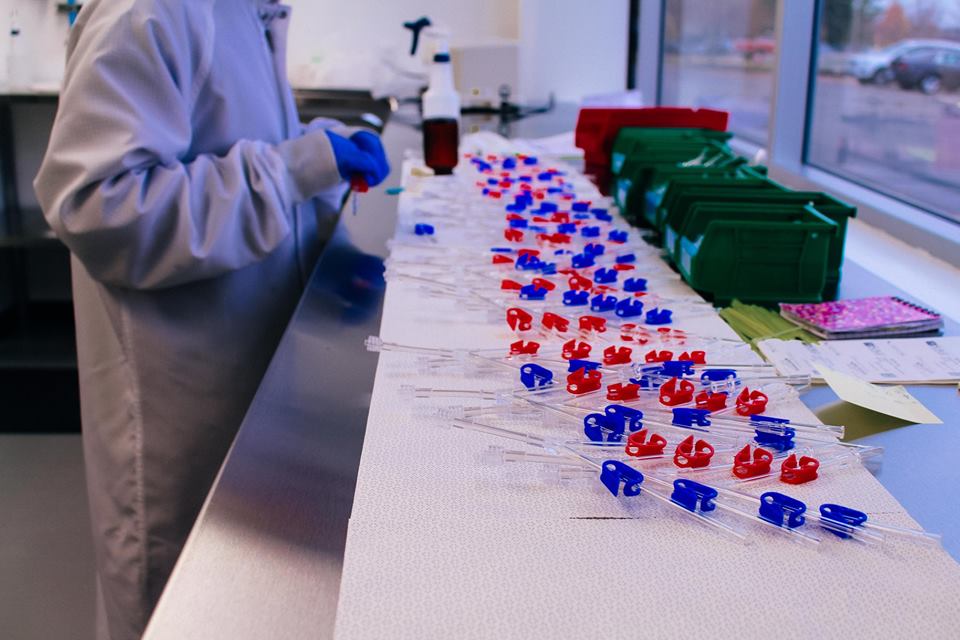Grand Valley State University (GVSU) and the Applied Medical Device Institute (aMDI) in Michigan have been awarded half a million dollars for a two-and-a-half year medical 3D printing study. Awarded by the Grand Rapids SmartZone, the fund will be used to determine whether Carbon DLS technology can reduce the cost and time it takes for medical devices to enter the market.
Carbon Digital Light Synthesis for medical
Carbon is the Silicon Valley-based company behind Digital Light Synthesis (DLS) 3D printing technology. DLS technology uses digital light projection and an oxygen permeable membrane to produce parts at high speeds. The technology is enabled by Carbon’s patented continuous liquid interface production (CLIP), a photomechanical process that uses a liquid interface of uncured resin and a passing light source.
In this forthcoming study, researchers from GVSU and aMDI will make use of DLS to create production-grade parts using medical grade materials. For this purpose, a Carbon M2 3D printer has been supplied to aMDI’s incubator space in GVSU’s Cook-DeVos Center for Health Sciences.
Though the company already has a medical-grade material on the market, and distribution across dental labs in the U.S., a key challenge of this project will be developing 3D printable materials suitable for intravenous use. “This study also provides a platform to teach the engineers of tomorrow different ways to manufacture products, and that is very important to our team at Carbon.” said Andy Savarese, Medical Technology Sales Manager at Carbon, Inc.
Community funding
The half-million dollar grant for this project was provided by the Grand Rapids SmartZone, a community board enabled by the Michigan State legislation. The aim of this board is to support high-technology entrepreneurs and businesses within the city of Grand Rapids.
In addition to GVSU, aMDI, and Carbon, the program is supported by MediSurge, a medical device manufacturer based in West Michigan. MediSurge believes that 3D printing technology will help enhance the current medical device market. Bob Taylor, CEO of Alliant Healthcare Products and MediSurge, explains, “The current process of launching a new medical device to market in the United States is strictly regulated, highly complex, and expensive, so we understand the importance of perfecting this type of emerging technology,”
“Being able to offer this type of novel service would drastically decrease time to market for products and create immense value for customers.”
Revolutionizing the Medical Device Market
The aMDI is a non-academic unit of GVSU where students and faculty work to develop medical devices and bring them into commercial use. Brent M. Nowak, founding Executive Director of aMDI, believes that 3D printing manufacturing could have a positive impact on the medical device industry. Over a dozen students from GVSU will be joining the aMDI team, as well as faculty, to take part in the 3D printing project.
“We are on the cusp of revolutionizing the medical device manufacturing industry, and that will not only grow and retain talent here in West Michigan, but will attract new talent from outside of the region.”
Nowak adds that GVSU is “thrilled to be the first university in the Midwest to provide students with direct access to this type of innovative technology on campus.”

Could this be 2019’s award-winning medical application of 3D printing? Make your nominations now for the 3D Printing Industry Awards. Voting opens in March 2019.
For more of the latest healthcare news subscribe to the 3D Printing Industry newsletter, like us on Facebook, and follow us on Twitter. Find 3D Printing Jobs near you now.
Featured image shows Carbon’s Continuous Liquid Interface Production (CLIP) 3D printing in action. Screengrab via Carbon on YouTube

